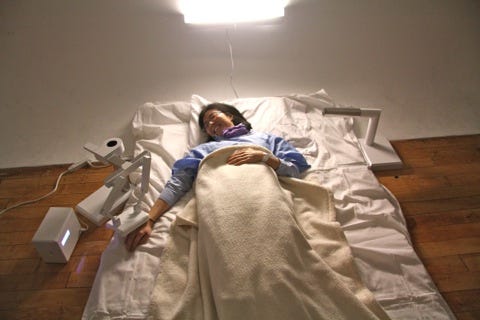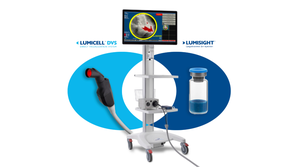That's the question art student Dan Chen challenges audiences with in his File > Save As > Intimacy project. The art project, made for his masters thesis at Rhode Island School of Design features a medical device, called the End of Life Care Machine, that is designed to provide comfort to dying patients in their last moments. It might be a heartwarming thought, but Chen's project is not designed to illicit comfort.
June 11, 2012
 That's the question art student Dan Chen challenges audiences with in his File > Save As > Intimacy project. The art project, made for his masters thesis at Rhode Island School of Design features a medical device, called the End of Life Care Machine, that is designed to provide comfort to dying patients in their last moments. It might be a heartwarming thought, but Chen's project is not designed to illicit comfort. Susie, the voice of the machine, speaks in a monotone computerized drawl more suited to a female Hal 9000 than a care provider.
That's the question art student Dan Chen challenges audiences with in his File > Save As > Intimacy project. The art project, made for his masters thesis at Rhode Island School of Design features a medical device, called the End of Life Care Machine, that is designed to provide comfort to dying patients in their last moments. It might be a heartwarming thought, but Chen's project is not designed to illicit comfort. Susie, the voice of the machine, speaks in a monotone computerized drawl more suited to a female Hal 9000 than a care provider.
In a statement on his Web site Chen says, “The process of dying is probably the most vulnerable moment of a human life, where one seeks the assurance of human connection. In this installation, human presence is replaced it with a robot, questioning the quality of intimacy without humanity”
The result can be disconcerting, but it's also provocative. When so much of healthcare is becoming automated Chen's project asks us to keep our minds on the human element. A robot might be great for quick checkout at the grocery store, but when it comes to health we may want to forgo the convenience of automation for the warmth of real human contact.
Watch the video below as Susie helps a patient through her transition...maybe she can come over and watch your kids afterward.
- Chris Wiltz is the Associate Editor of MD+DI
You May Also Like


